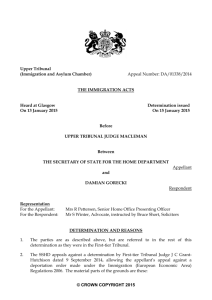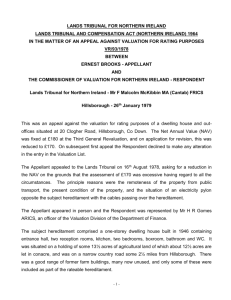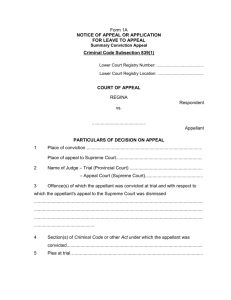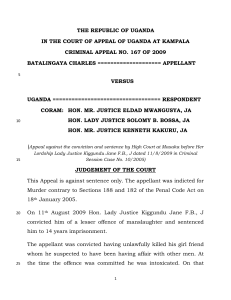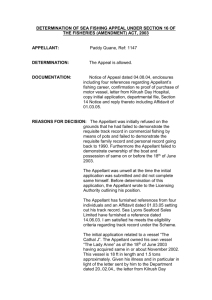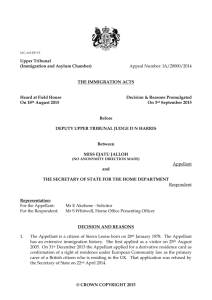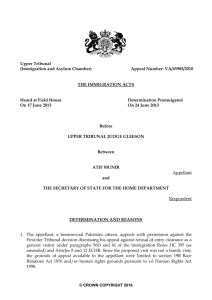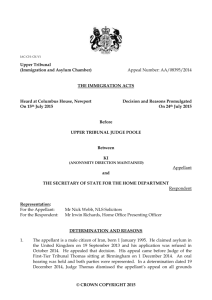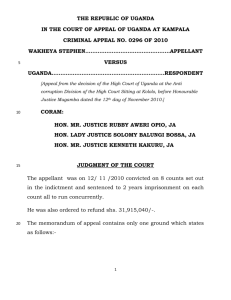Appeal Number: OA/07808/2013 Upper Tribunal (Immigration and
advertisement
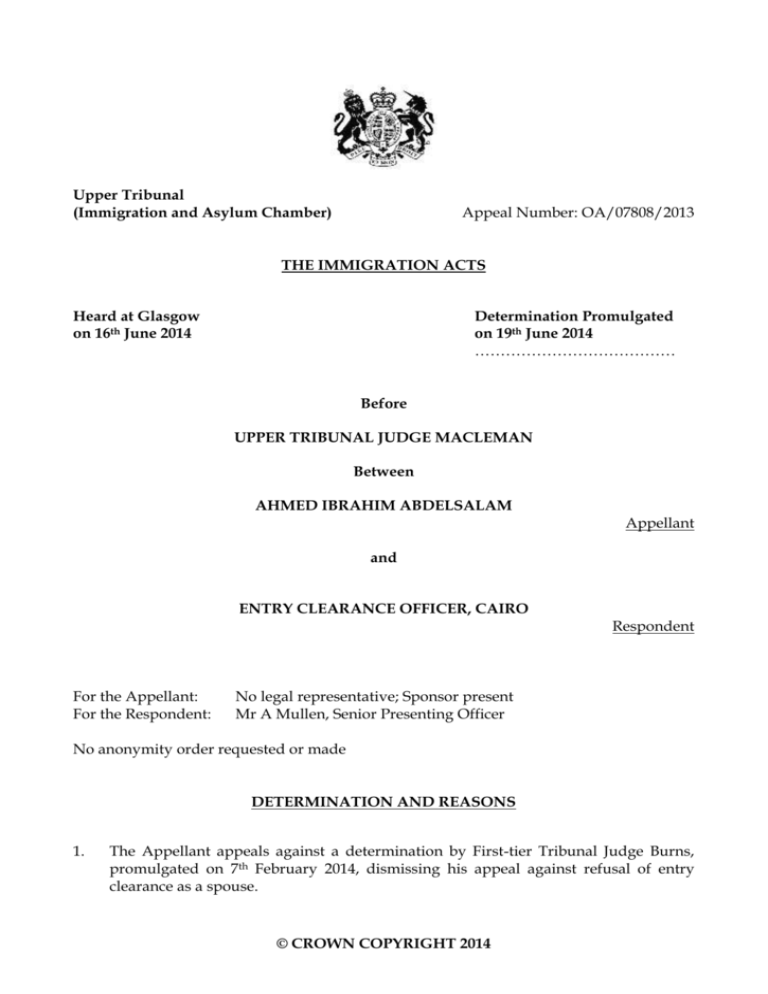
Upper Tribunal (Immigration and Asylum Chamber) Appeal Number: OA/07808/2013 THE IMMIGRATION ACTS Heard at Glasgow on 16th June 2014 Determination Promulgated on 19th June 2014 ………………………………… Before UPPER TRIBUNAL JUDGE MACLEMAN Between AHMED IBRAHIM ABDELSALAM Appellant and ENTRY CLEARANCE OFFICER, CAIRO Respondent For the Appellant: For the Respondent: No legal representative; Sponsor present Mr A Mullen, Senior Presenting Officer No anonymity order requested or made DETERMINATION AND REASONS 1. The Appellant appeals against a determination by First-tier Tribunal Judge Burns, promulgated on 7th February 2014, dismissing his appeal against refusal of entry clearance as a spouse. © CROWN COPYRIGHT 2014 Appeal Number: OA/07808/2013 2. The ECO decided on 18 March 2013 that the Appellant could not benefit from paragraph E-ECP.3.3 of Appendix FM of the Immigration Rules, but gave no reason. That provision enables financial requirements to be met by showing that the applicant’s partner is in receipt of carer’s allowance, along with “evidence that their partner is able to maintain and accommodate themselves, the applicant and any dependants adequately in the UK without recourse to public funds.” 3. The Sponsor is in receipt of carer’s allowance, in respect of her disabled daughter. 4. In his Grounds of Appeal to the First-tier Tribunal, supported by an extract from a UKBA website, the Appellant maintained that he did fall within E-ECP.3.3 because his Sponsor is in receipt of carer’s allowance. The UKBA source continues, “You will need to show that your Sponsor can maintain and accommodate you without access to public funds”. 5. Notwithstanding those well focussed Grounds, a review by an Entry Clearance Manager dated 4th September 2013 is in standard and unhelpful terms, maintaining the original refusal. 6. At paragraph 28 of his determination Judge Burns took the view that because the Sponsor receives and intends to continue receiving carer’s allowance “therefore EECP.3.3 is not a route available to this Appellant. That appears to be an interpretation consistent with paragraph 21 of Appendix FM-SE.” 7. Mr Mullen acknowledged that the Judge’s interpretation is not correct. Reliance on E-ECP.3.3 assumes continuing receipt of carer’s allowance. To read the provision as requiring a Sponsor to give up the income which triggers its application would be absurd. Mr Mullen also took the approach that the Appellant’s possible earnings in the UK could not be taken into account in relation to the Sponsor’s ability to maintain and accommodate, but that his savings were relevant. 8. Submissions did not focus on that latter point, and I do not find it to have a clear answer. Looking at E-ECP.3.3 in isolation, why should the ability of one partner not contribute to the other’s ability? On the other hand, is the mention of a partner but not an applicant (which contrasts with other provisions of the Rules) designed to mean that the ability must be of the partner alone? Why might savings be relevant but not likely earnings? As Judge Burns said (¶25) these provisions are difficult to follow. Without any disrespect to the ECO, the ECM and the two Presenting Officers who have been assigned a difficult task (no doubt in each case under pressure of time), it is an unsatisfactory system which does not produce any clear analysis from the respondent even after such prolonged procedure. (I add that Mr Mullen did his utmost to help the UT to work towards the correct outcome on the day.) 9. Mr Mullen did not say that paragraph 21 of Appendix FM-SE supports the disapplication of E-ECP.3.3, and I see nothing in paragraph 21 to that effect. 2 Appeal Number: OA/07808/2013 10. For purposes of this case, I am content to adopt the approach proposed by the Presenting Officer, which is: E-ECP.3.3 does apply; the Appellant’s prospective earnings do not count; his savings do count. 11. Mr Mullen advised that the period of initial admission in such a case is 33 months. While the Rules do not specify a period for which funds for maintenance and accommodation must be shown, he suggested that period would be the appropriate benchmark. The Appellant has savings equating to £21,000. The weekly income support level for a couple is £113.70. The Sponsor’s mortgage is due to be paid off soon. Her monthly repayments are modest (in the range £82.79 to £77.98 from November 2011 until August 2012, according to an annual mortgage statement produced with the application). Having examined the relevant information, Mr Mullen finally, and very fairly, acknowledged that not only had there been error of law in failing to identify that E-ECP.3.3 is a route available to the Appellant, he succeeds in meeting the requirements of that paragraph. 12. Having reached that conclusion, no submissions were made on Article 8, although that is what led to the grant of permission to appeal to the UT. In the alternative, and recognising the limited scope of Article 8 outside the Rules, there would be at least a good arguable case. Apart from maintaining the Rules, there appears to be little public interest in excluding the Appellant. The Sponsor is a UK citizen who has always lived here, does not speak Arabic, and has all her family and private life here, which includes caring for her disabled daughter. 13. The determination of the First-tier Tribunal is set aside. The following determination is substituted: the appeal, as originally brought to the First-tier Tribunal, is allowed under the Immigration Rules. 19 June 2014 Upper Tribunal Judge 3


